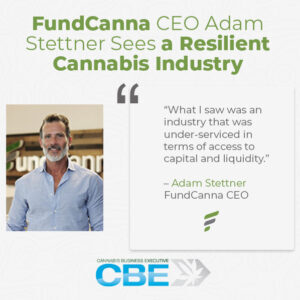FundCanna CEO Adam Stettner talks cannabis lending, challenges, opportunities and more
In this edition of "Rising High," The Fly conducted an exclusive interview with Adam Stettner, Chief Executive Officer and founder of FundCanna, a provider of capital for small- to medium-sized businesses throughout the cannabis sector.
PRODUCT EVOLUTION:
FundCanna is a leading source of debt capital to the cannabis industry, offering funding products that are customizable, flexible, renewable and designed exclusively for cannabis operations and the ancillary companies that support the space. "The way FundCanna sets itself apart is that we're only lending or providing access to capital for cannabis," Stettner said. "In order to do that effectively, we have to listen to clients, pay attention to what is going on in the industry and make sure that our products are constantly evolving to keep up with their needs."
Many lenders create a credit box and then try to make their clients fit that box, he said. "What the team at FundCanna tries to do is study the industry, listen to our clients and create a customized solution that fits what each cannabis company needs to effectively run their business," the CEO said, "But that still meets appropriate credit parameters and permits us to have longevity so that we can service the industry."
DISTRU PARTNERSHIP:
In September, FundCanna entered a partnership with Distru as the company's preferred lending partner. FundCanna will be able to offer Distru's growing list of clients financing where they already operate, directly through the Distru platform with approvals in as little as 24 hours. "I've always believed and will continue to build our company on the idea that you can't be an excellent partner if you do everything alone," Stettner said. "The right way to approach servicing an industry is to find other strong companies that service the industry and collaborate."
Distru, a seed-to-sale ERP platform for cannabis operators, has "phenomenal" technology, he said, adding FundCanna always wants to be present where its clients are. "If there is a way for us to embed access to our funding solutions in Distru's platform, it creates convenience, allegiance and trust," the CEO said. "It also helps both companies build on reputation, but really for the client, it's a matter of convenience. I want to be where they need us, I don't want them to have to seek us out."
Partnering with firms that have strong integrity and solid reach creates a win-win-win situation for FundCanna, their partners and their clients, he said. "That is what we are trying to do with Distru," Stettner said. "If we can partner with market leaders in their respective fields, then we're really making their offerings stronger and enhancing their offerings because we are infusing it with access to capital. We are in the service industry and these partnerships enable us to have a broader reach and provide a higher level of service."
NABIS COLLABORATION:
Additionally in September, FundCanna entered a partnership with Nabis to be the company's preferred lending partner. Nabis' partners now have a channel for financing through FundCanna, with approvals in as little as 24 hours. "Nabis is the largest distributor in California," the CEO said. "They work with over 300 brands and in one way or another over 99% of retailers in California are leveraging the Nabis platform. Their technology, service level and reputation are outstanding and we want to be there for their brands, retailers and all the sellers and buyers that are on their platform."
He added money serves as a connection for all clients that are using the Nabis platform. "If you're selling product, you need to get paid and if you're buying product, you need to pay for the product," Stettner said. "All too often in cannabis, product comes without terms and it's all cash on delivery. There is a downtime between the outlay to purchase the product and the time to create revenue. If Nabis and FundCanna can partner to give both brands and sellers access to more clients and give those buyers the ability to pay for that product over time, then everybody wins."
FundCanna will be able to offer those parties access to liquidity and extended terms, again creating convenience for clients, he said. "It opens up the ability for clients to access cash flow more freely and to buy or sell more, thereby expanding their topline number using somebody else's capital and not having liquidity restraints," the CEO said.
SCHEDULING:
In August, the U.S. Department of Health and Human Services made a recommendation to the Drug Enforcement Agency that cannabis be moved from Schedule I to Schedule III under the Controlled Substances Act. "The recommendation is by far the most significant indication of policy change since the Cole Memo, which made it possible for states to legalize cannabis," Stettner said. "This is massive. It still does not go far enough, in my opinion, but it is momentous for the industry. I think it could be a huge win, but it also still needs to happen."
If the recommendation does proceed, he said he expects it would need to pass under the current administration. "I don't always understand how politics work because it doesn't follow logic," the CEO said. "We have momentum now and must capitalize on this before the potential of an administration change. If the administration were to change, we risk losing some of the momentum. My hope is that we see this move quickly through the DEA and then ultimately if that occurs, there would be some level of FDA regulation."
The passage would help resolve some of the issues surrounding 280E and taxation, he said, as cannabis will no longer be viewed as illicit. "It would have an immense impact on cost of goods and relative taxation of the same," Stettner said. "Right now, there is no ability to write off your cost of goods, I believe that would change if this passes. That would have an amazing impact on company revenue and how that revenue flows through to a cannabis company's bottom line."
He noted even with the passage, the industry will still face a lot of unknowns. "The areas that are of concern to me are interstate commerce and interaction with the individual states relative to the federal government," the CEO said. "I think we need an update to the Cole Memo or a new memo that outlines how the state and federal governments interact in that new world, but it is amazing momentum and would have a very positive impact on cannabis businesses."
Get the working capital you need. Fast.
Approvals in as little as 24 hours
Share this article on
More From Our Blog
Follow Us
Explore
info@fundcanna.com













